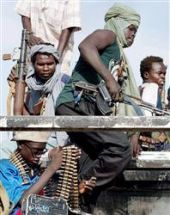EU aid chief condemns ceasefire violations in Sudan’s Darfur
NYALA, Sudan, Nov 27 (AFP) — Visiting EU aid commissioner Louis Michel on Saturday denounced continued violations of a ceasefire agreement in Sudan’s troubled Darfur region, which he said had forced aid workers to flee.

|
|
Sudanese rebel gunmen prepare to patrol the village of Muhajiriyah in rebel-held South Darfur, Sudan, Saturday Oct. 23, 2004 (Sipa). |
“The violation of the Abuja agreements on a daily basis has to stop,” said Michel in a statement distributed to reporters accompanying him to Nyala, the capital of South Darfur state.
The situation “has deteriorated to such an extent that the aid workers have been forced to flee the region,” it added.
Michel’s two-day visit coincides with an upsurge of violence pitting Khartoum and its militia allies against ethnic minority rebels in Darfur who are fighting for greater political and economic autonomy.
He hammered home his call for an immediate end to the violence during separate talks with South Darfur’s deputy governor, Idriss Adan al-Silaik, and North Darfur governor, Osman Yusuf Kibir, on his whirlwind tour.
“The rebels are also responsible for the crisis and should therefore respect the ceasefire and help the humanitarian agencies,” Michel said.
The Abuja protocols — which he said had helped “a lot” to remove difficulties laying the ground for humanitarian operations — “must be respected”.
Any final peace deal between Khartoum and the southern rebels, would trigger the European Union’s approval of “huge funds” for Sudan development, he said.
Despite noting an overall “slow improvement” in general, he urged Silaik to continue to allow humanitarian organisations to carry out their desperately needed aid work in South Darfur.
He also told him point blank to avoid force in relocating internally displaced persons (IDPs) from one camp to another, which he said must be carried out in coordination with aid groups.
“We are aware of your problems with the IDPs and we know it is not easy to deal with the camps. But still we call upon you to deal with the IDPs in a better way. We do not accept violence to be exacted on IDPs.
“It is the government that is responsible for the safety of the IDPs, particularly the women and children, an aspect which is of concern to the public opinion in Europe,” he added.
Maintaining that his government was “cooperating fully” with the EU and non-governmental organisations (NGOs), Silaik said Khartoum had expected “more assistance from the EU” and defended his policy on internally displaced people.
“It is the state government that chooses a venue for an IDP camp, rather than the IDPs themselves,” he said.
Michel then held a closed-door meeting with some 15 tribal leaders in camp Kalma, about 17 kilometres (11 miles) east of Nyala.
An aide told reporters that the chieftains had complained about police forcing displaced people out of one camp, killing one person and arresting 272 others on August 8.
They also said that at least 53 women had been raped by unidentified men.
“They (police) shoot casually from their nearby station during the night,” one camp resident told AFP, to the vigorous support of others standing nearby in Kalma, packed with more than 80,000 displaced persons from non-Arab tribes.
Two or three other residents also complained of minimal food supplies after just emerging from 40 days with nothing.
Michel then flew to the capital of North Darfur state, where he had another closed-door meeting with the African Union ceasefire commission, North Darfur governor Kibir and the visiting president of the International Committee of the Red Cross (ICRC), Jakob Kellenburger.
Like Silaik, Kibir promised full cooperation with the EU and other organisations, but vowed to treat the displaced, especially women and children, well.
“After all they are our kin and we are responsible for them,” he said.
But unlike South Darfur, he denied any problems in moving diplaced people. Should it be necessary to do so, he promised to cooperate with international groups.
“When you come back here you will find me wearing civilian clothes instead of this uniform,” said Kibir, implying a quick end to the 21-month conflict.
Tens of thousands of people have died in the fighting that has also displaced some 1.6 million people and led to the world’s worst humanitarian crisis, according to the United Nations.
